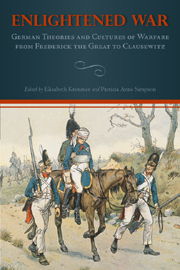Book contents
- Frontmatter
- Contents
- List of Illustrations
- Acknowledgments
- Introduction: Enlightened Warfare in Eighteenth-Century Germany
- Part I War and Enlightenment
- 1 The Point of Recognition: Enemy, Neighbor, and Next of Kin in the Era of Frederick the Great
- 2 Writing War and the Aesthetics of Political Literature in the 1790s: Daniel Jenisch's (Un)timely Seven Years' War Epic Borussias
- Part II Cultures of War in Classicism and Romanticism
- Part III War and Gender
- Part IV War and Theory
- Bibliography
- Notes on the Contributors
- Index
1 - The Point of Recognition: Enemy, Neighbor, and Next of Kin in the Era of Frederick the Great
from Part I - War and Enlightenment
Published online by Cambridge University Press: 05 February 2013
- Frontmatter
- Contents
- List of Illustrations
- Acknowledgments
- Introduction: Enlightened Warfare in Eighteenth-Century Germany
- Part I War and Enlightenment
- 1 The Point of Recognition: Enemy, Neighbor, and Next of Kin in the Era of Frederick the Great
- 2 Writing War and the Aesthetics of Political Literature in the 1790s: Daniel Jenisch's (Un)timely Seven Years' War Epic Borussias
- Part II Cultures of War in Classicism and Romanticism
- Part III War and Gender
- Part IV War and Theory
- Bibliography
- Notes on the Contributors
- Index
Summary
THE TERM MILITÄRISCHE AUFKLÄRUNG (military enlightenment) as it is used today refers to reconnaissance, to the active gathering of information about an enemy's intentions, capabilities, and position. It involves issues of recognition, of seeing, of interpreting, of understanding, and all with the intent of modeling one's own response appropriately to engage or otherwise defeat a recognized enemy.
In the eighteenth and early nineteenth centuries, militärische Aufklärung was an idea interwoven with philosophical discourse. Then as now, it involved dynamics of cognition and recognition; then, as now, it was concerned with the identification of both self and enemy. However, the ambitions of this recognition in the eighteenth century reached beyond positional mapping and strategic response, and involved finely tuned intellectual and psychological insights into cultural difference, human rivalry, and the limits of rational control.
During the second half of the nineteenth century, perceptions of Enlightenment values and representations of military culture separated themselves so thoroughly that now it seems implausible to many that they should be studied together. This essay reconstructs a legacy that includes not only celebrated plans for perpetual peace, but also equally “enlightened” theories of perpetual war. Such writings on war were concurrent with peace projects, drawing upon similar tropes and staging an equal claim to enlightenment. While Immanuel Kant's treatise on perpetual peace tends to dominate discussions of enlightenment and warfare, Frederick the Great's essays on the subject are seldom discussed in this context.
- Type
- Chapter
- Information
- Enlightened WarGerman Theories and Cultures of Warfare from Frederick the Great to Clausewitz, pp. 21 - 40Publisher: Boydell & BrewerPrint publication year: 2011

